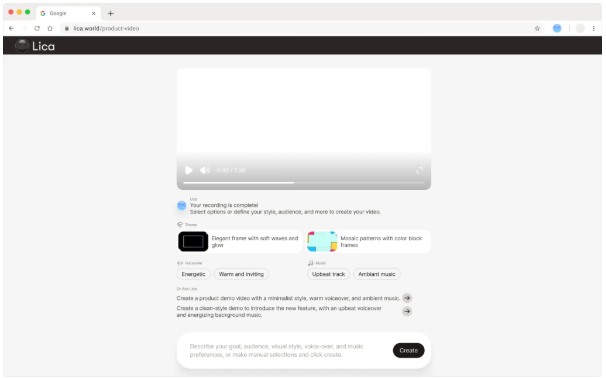In a fast-paced business environment, efficient content creation is crucial. The cumbersome video production process often becomes a bottleneck for many teams. Two former Microsoft employees keenly captured this pain point and took this as an opportunity to create Lica, an AI tool that can convert screenshots and screen recordings into beautiful tutorials and product videos with one click. The emergence of Lica undoubtedly provides a new solution for simplifying the video production process and improving efficiency.
Within product teams, mountains of screen recordings and screenshots often go unnoticed, making creating videos time-consuming and expensive. However, two employees who had worked hard at Microsoft saw the opportunities in this market and decided to launch an AI tool called Lica to easily convert screenshots and screen recordings into wonderful tutorials and product videos.
The startup was founded in 2023 by two former Microsoft employees, Priyaa Kalyanaraman and Purvanshi Mehta. Kalyanaraman served as a product manager at Microsoft and was also involved in the development of AI features for PowerPoint and Microsoft Designer. She found that business users have an urgent need for AI assistants and want to make daily creation more convenient. She initially struggled to start a business due to visa issues, so she created a small demo at a hackathon and posted it on social media, which caught the attention of Replit founder Amjad Masad.

At the same time, Mehta was also developing content personalization projects independently. After being introduced by a friend, the two decided to jointly create a video storytelling tool because they found that the tools on the market were often flashy and of little use.
Lica has just completed a $4 million round of seed financing, led by Accel, with participation from South Park Public, Village Global and multiple angel investors such as Replit CEO Amjad Masad and former a16z partner Balaji Srinivasan.
Aditya Agarwal, managing partner of South Park Public, who has worked at Dropbox and Meta, points out that in the past, people often used a combination of documents and slides to convey ideas, and video production was expensive and time-consuming. This makes Lica particularly important, filling this gap.
With the help of Lica, users can easily generate product videos or explanation videos, and AI will automatically add transitions, background music, and special effects. Users can also manually add parts, such as narration text, and use prompts to guide the AI assistant to generate a specific style of video, such as "Make a tutorial video in the language of Generation Z."
After the video is generated, users can modify the voice tone, subtitles, language, style and music through prompts. Kalyanaraman said that many people don’t know how to accurately describe the video effect they want, which often leads to repeated revisions, and Lica is like a fast AI producer that helps users save time.
The two founders also emphasized that Lica understands design aesthetics. When users enter unusual designs or color choices, the tool ensures the final result is beautiful but not eye-catching. Mehta mentioned that the AI assistant uses two models: one is the coordinator, which is responsible for putting different parts together and selecting the best narration voice; the other is the layout generator, which is responsible for arranging the way the screen recording or text is displayed. The company also leverages both open source and closed source models to handle features such as audio generation.
Currently, Lica offers a free version that allows users to generate 10 short videos of up to 3 minutes each, which can be downloaded three times per month. And if you want unlimited video generation up to 10 minutes, you can choose to pay $49 per month and get branded templates.
While the tool is currently focused on product and tutorial videos, in the coming months, Lica also plans to optimize its AI assistant to support more video formats such as marketing, presentations, social media, and investor presentations.
Lica may not have direct competitors, but other companies and entrepreneurs often use Zoom or screen recording to create simple videos, occasionally polished with tools like Loom. AI startups that rely on avatars for tutorial videos or internal communications, such as D-ID and Synthesia, are taking a different approach.
Accel's Sameer Gandhi believes the perfect combination of Lica's team and product approach gives it a unique advantage. "Lica helps users maintain creative control while enjoying AI assistance by combining advanced AI capabilities with intuitive design," he said. "Coupled with the team's background in generative AI and product development, we believe they are well positioned to solve Uniquely positioned on key needs that the market has not yet fully captured.”
With its powerful AI capabilities and user-friendly design, Lica is expected to completely change the way video production is done, saving users a lot of time and cost, and becoming a dark horse in the future video creation field. Its continued innovation and focus on user needs will further consolidate its market position.